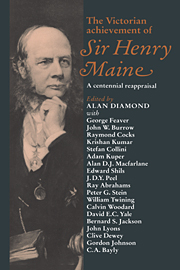Book contents
- Frontmatter
- Contents
- Notes on contributors
- Foreword by Sir John Lyons
- Introduction
- 1 The Victorian values of Sir Henry Maine
- PART 1 MAINE AND THE IDEA OF PROGRESS
- PART 2 MAINE AND THE SOCIAL SCIENCES
- PART 3 MAINE ON LAW, LEGAL CHANGE AND LEGAL EDUCATION
- PART 4 MAINE AND INDIA
- 18 The influence of Sir Henry Maine on agrarian policy in India
- 19 India and Henry Maine
- 20 Maine and change in nineteenth-century India
- Appendix: the conference programme
- Bibliography
- Index
20 - Maine and change in nineteenth-century India
Published online by Cambridge University Press: 04 September 2009
- Frontmatter
- Contents
- Notes on contributors
- Foreword by Sir John Lyons
- Introduction
- 1 The Victorian values of Sir Henry Maine
- PART 1 MAINE AND THE IDEA OF PROGRESS
- PART 2 MAINE AND THE SOCIAL SCIENCES
- PART 3 MAINE ON LAW, LEGAL CHANGE AND LEGAL EDUCATION
- PART 4 MAINE AND INDIA
- 18 The influence of Sir Henry Maine on agrarian policy in India
- 19 India and Henry Maine
- 20 Maine and change in nineteenth-century India
- Appendix: the conference programme
- Bibliography
- Index
Summary
Dr Dewey's chapter sees Sir Henry Maine as the prophet and inspiration of the sea-change in policies and attitudes which overtook the British in late nineteenth-century India. The government of the East India Company, in theory at least, had been a rule of modernity, moulded by utilitarianism, Ricardian rent theory and evangelicalism. The eighteenth-century landholding interest had come to be regarded as ‘drones on the soil’, impeding the improving labour of the yeomanry. The Indian states were faded exemplars of oriental despotisms, to be swept away where possible by escheat when their rulers died without heirs. An English legal philosophy of individualism was to be grafted on to the Hindu law books, and oriental texts were to be superseded by English education. Capitalist enterprise was to transform the Indian economy, and as far as possible the moral reformation was to be completed by the onslaught of Christian missionizing against a dying Hinduism. This modernizing deluge, at its height in the so-called Age of Reform of the 1830s and 1840s, was classically analysed in the first work of Eric Stokes, The English Utilitarians and India (1959). Later the supposed utilitarian impact on land revenue and judicial policy was investigated in detail by scholars such as Ravinder Kumar (1968) and Thomas Metcalf (1965). It was this inheritance of ideas and policies that Maine and his pupils are seen finally to have laid to rest.
- Type
- Chapter
- Information
- The Victorian Achievement of Sir Henry MaineA Centennial Reappraisal, pp. 389 - 397Publisher: Cambridge University PressPrint publication year: 1991
- 3
- Cited by



